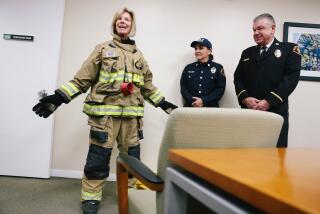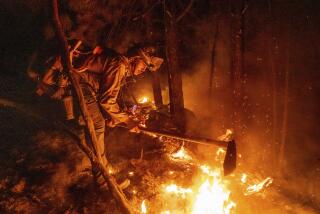Doctors aren’t telling overweight firefighters to lose weight, study says
- Share via
Sexy images of rippling abs and rock-hard biceps under those firefighter uniforms may obscure a serious problem: More than 70% of firefighters are overweight or obese, and most of them reported getting no advice to lose weight from their healthcare professionals, researchers said Thursday.
“Obesity is a major threat to firefighter health and safety,” the researchers wrote in Preventing Chronic Disease, from the Centers for Disease Control and Prevention.
“There are a lot of firefighters who are in great shape,” but many are not, said Rena Sue Day, one of the authors of the study, who is an associate professor of epidemiology at the Michael & Susan Dell Center for Health Living at the University of Texas Health Science Center at Houston School of Public Health. “Bigger doesn’t always mean stronger, there’s a difference between fitness and being big.”
The study said cardiovascular events — often related to diet and weight — are the leading cause of firefighters’ deaths in the line of duty.
“Something has to be done,” Day said by phone. “It’s really a missed opportunity and that’s the important message.”
Day and her colleagues used data from a 2011-12 national sample of 1,002 male firefighters. Ninety-six percent said they visited a healthcare professional in the last year. But 69% said they got no weight advice. Even among those who were obese, 48% said they got none.
Younger firefighters were less likely to get advice about weight, unless they were in the two highest weight categories.
“I found that to be quite a surprise, because that’s not what we’re seeing” in fire departments that have wellness programs, said Patrick Morrison, assistant to the president of the International Assn. of Firefighters for health and safety. “The sit-down consultation means so much” in a physical exam, he said.
But, he added, not enough departments have those programs in their plan.
Because guidelines from several healthcare organizations call for body mass index to be used in considering a patient’s weight status, the researchers used that measure too, Day said. It is calculated as weight in kilograms divided by the square of height in meters. However, she said they looked at other measures and the problem remained using those.
Morrison said BMI can be faulty; some people with lots of muscle may appear to be overweight, he noted.
Day said she hopes the study will encourage doctors to screen all patients for weight and talk about how to lose it without waiting for a person to develop diabetes or hypertension.
“We need to get these 20 year-olds who are overweight and obese and begin there,” she said.
Firefighters also have gained a reputation as good cooks. Many live at fire stations while on duty, and cook for one another. Day said that’s one possible area for education. In addition, she said, firefighters need exercise opportunities while at work.
“The cultures vary widely across the U.S. The eating and activity culture, the sleep,” all behaviors that affect firefighters’ health, Day said.
She said people in some communities have complained that tax dollars were paying firefighters who were working out or mowing the lawn at the stations, adding: “Would you rather they go inside and watch TV?”
The researchers are seeking funding for a proposal to work with firefighters on this issue.
Care about health? Follow me on Twitter: @mmacvean







